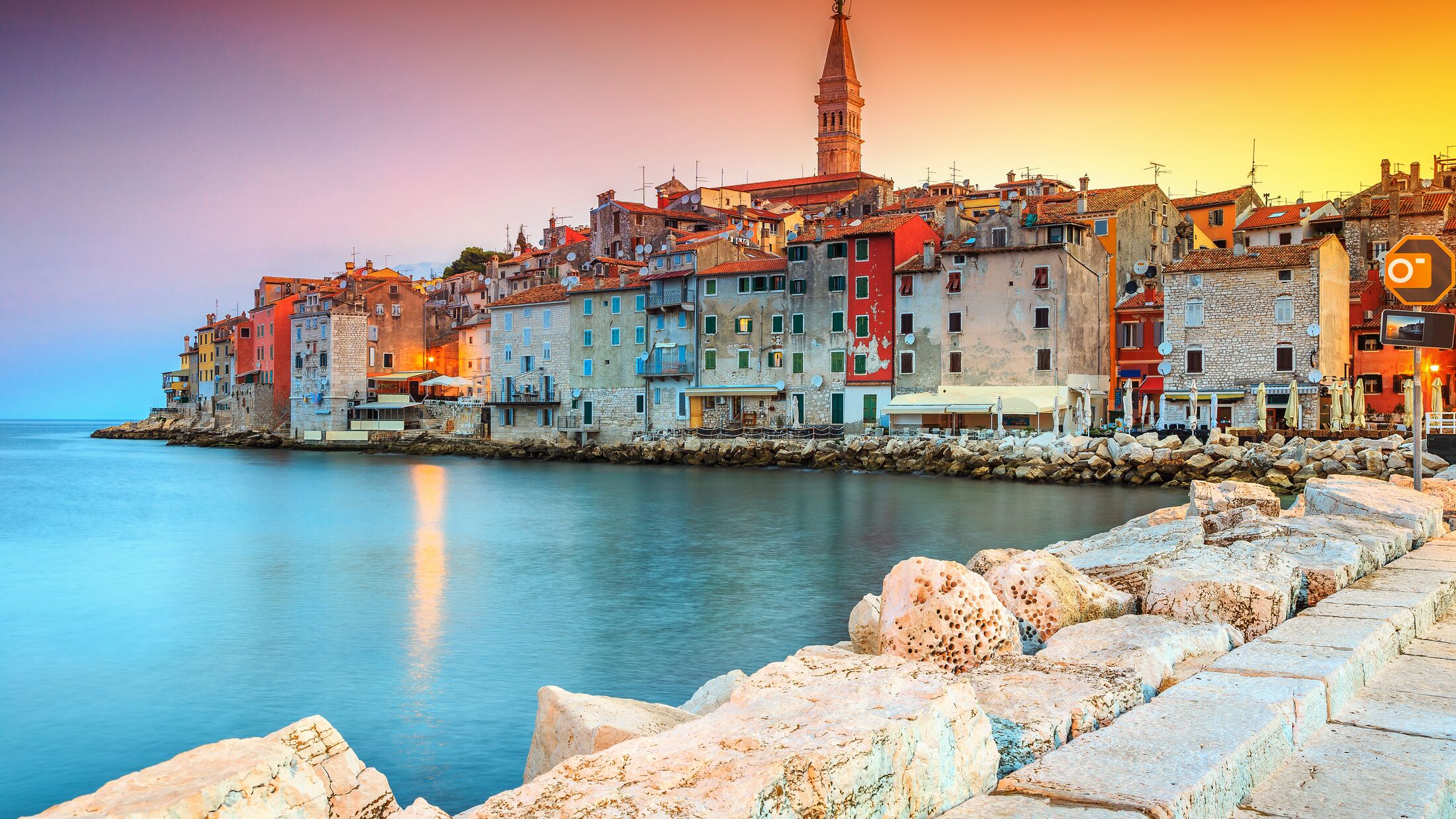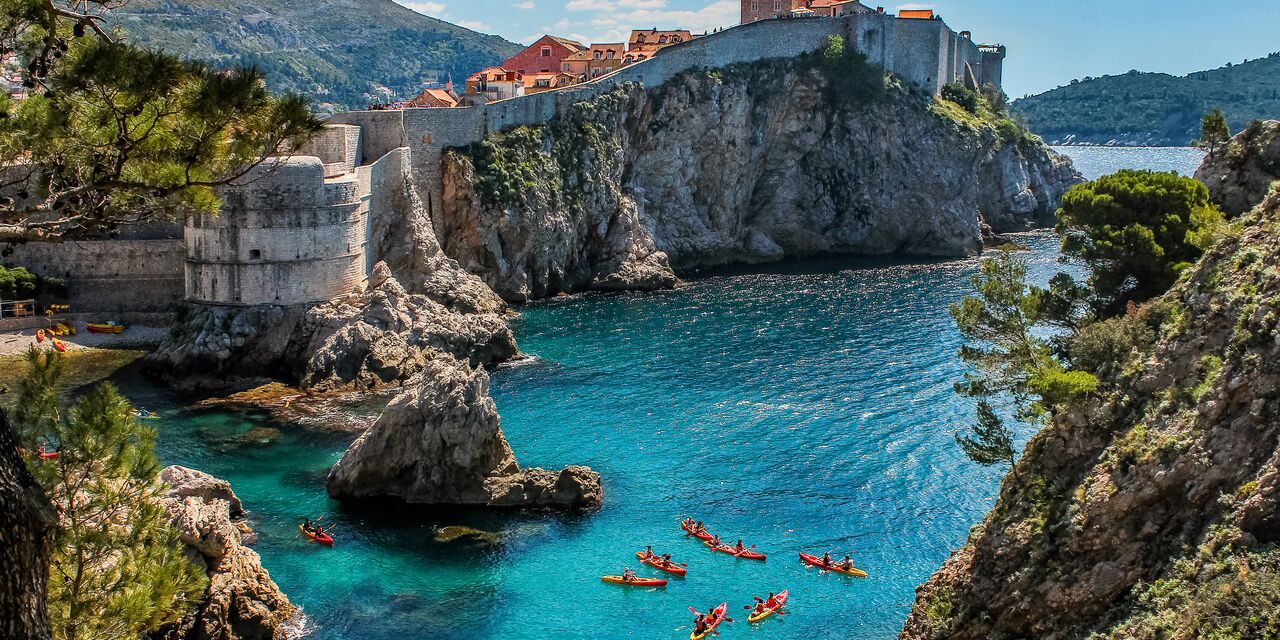CHAT
WITH US
WITH US
GET A
QUOTE
have questions? call us
+44 3330 907053
Home
/
Guides
/
Moving Guides
/
The Complete Step-by-Step Guide to Moving to Croatia from the UK
The Complete Step-by...

Moving Guides • Europe • 08 Jan 2025
Share this article
Did you know? Croatia boasts one of Europe's fastest-growing digital nomad communities, with the country introducing a specific Digital Nomad Residence Permit in 2021, making it an increasingly attractive destination for remote workers and professionals.
The decision to relocate to Croatia marks the beginning of an exciting journey into a country that perfectly balances rich historical heritage with modern European living. This comprehensive guide will navigate you through the intricate process of moving to Croatia, ensuring you understand each requirement and complete every necessary step in the optimal sequence.
Your Croatian journey begins with thorough research and careful consideration of various Croatian locations and factors that will impact your new life. Start by visiting the Croatian Ministry of Foreign and European Affairs website to understand the current entry and residence requirements for British citizens post-Brexit.
Understanding Croatia's distinct regions is essential for choosing your ideal location. Each area offers unique advantages:
The Dalmatian Coast provides Mediterranean lifestyle opportunities with excellent connectivity through cities like Split and Dubrovnik. The Zagreb metropolitan area offers the most substantial employment prospects and urban amenities. Istria combines Italian influence with Croatian culture, particularly attractive for those seeking a balance of coastal and inland living.
Visit the Expat in Croatia portal to gain practical insights from established expatriates and understand regional differences in detail.
Post-Brexit, British citizens must navigate new visa requirements for Croatian residency. Begin your application process by thoroughly reviewing the requirements on the Croatian Embassy in London's website.
Your residence permit options include:
First-time temporary residence permits based on:
For the application process, visit the Croatian Ministry of Interior website to understand specific documentation requirements. Processing times typically range from 4-8 weeks, making early application essential.
Securing employment or establishing your business presence in Croatia requires understanding both opportunities and restrictions. Begin by visiting the Croatian Employment Service portal to understand the current labour market conditions.
For those seeking employment, review positions through Croatia's leading job platforms:
Understanding Croatian labour law is crucial. The Ministry of Labour and Pension System provides comprehensive information about employment rights, working conditions, and social security requirements.

Establishing your financial presence in Croatia requires careful planning and understanding of the banking system. Begin by researching major Croatian banks through the Croatian National Bank portal.
Focus on these key financial aspects:
Documentation requirements for opening Croatian bank accounts are substantial and may include:
Consider engaging with banks that have dedicated expatriate services, such as Zagrebačka Banka or PBZ (Privredna Banka Zagreb), which offer English-language services and international banking expertise.
Croatia's healthcare system requires mandatory health insurance coverage for all residents. Begin by visiting the Croatian Health Insurance Fund (HZZO) to understand the system's requirements and benefits.
Healthcare preparation should include:
Understanding the two-tier healthcare system:
Gathering necessary documentation:

Securing appropriate accommodation in Croatia requires thorough understanding of both the rental and property markets. Begin your search through Croatia's primary property portals: Njuškalo and Index Oglasi.
When preparing for your housing search, understand that Croatian rental agreements typically require extensive documentation. Property owners expect to receive proof of income, employment contracts, and often seek personal references. The rental process in Croatia differs significantly from the UK, particularly regarding contract terms and tenant rights.
For those considering property purchase, visit the Croatian Chamber of Economy to understand property ownership regulations for foreign nationals. British citizens can purchase property in Croatia under reciprocity agreements, but the process requires careful attention to legal requirements and often necessitates professional assistance.
Success in Croatia strongly correlates with language proficiency and cultural understanding. Begin your language journey through the Faculty of Humanities and Social Sciences in Zagreb, which offers comprehensive Croatian language programmes for foreigners.
The cultural integration process extends beyond language acquisition. Understanding Croatian business etiquette, social customs, and cultural norms proves essential for both professional and personal success. Visit the Ministry of Culture website to explore cultural programmes and integration opportunities.
Essential cultural integration preparations should include understanding:
For families with school-age children, understanding Croatia's education system is crucial. The Ministry of Science and Education provides comprehensive information about educational options and requirements.
The Croatian education system offers several pathways:
International schools in major cities like Zagreb and Split provide education in English and other languages. Visit the International Baccalaureate Organisation website to explore IB programmes available in Croatia.
Understanding transportation options and requirements helps ensure mobility upon arrival. For those planning to drive, visit the Croatian Auto Club (HAK) website to understand driving requirements and regulations.
Key transportation considerations include:
Urban areas like Zagreb offer extensive public transportation networks, while coastal regions may require personal vehicles for optimal mobility. Research local transportation options through municipal websites and transportation authority portals.
Preparing essential documentation ensures smooth processing upon arrival. The e-Citizens portal provides information about administrative requirements and digital services.
Priority administrative tasks include:
The physical relocation of your belongings requires careful planning and understanding of Croatian customs regulations. Visit the Croatian Customs Administration website to understand import requirements and restrictions.
Ready for a seamless relocation experience? Contact Deliver1 for comprehensive moving services tailored to your UK to Croatia move. Our experienced team specialises in handling all aspects of international relocations, ensuring your belongings arrive safely at your new Croatian home.
When preparing for the physical move, you must understand customs documentation requirements, including:
Establishing essential services requires coordination with various providers. Begin by visiting HEP, Croatia's national electricity provider, to understand connection procedures.
Essential utilities and services include:
For telecommunications, major providers like Hrvatski Telekom and A1 offer packages combining internet, mobile, and television services.
Building professional networks proves essential for long-term success in Croatia. Visit the British-Croatian Chamber of Commerce to connect with fellow British professionals and local business leaders.
Professional integration strategies should focus on:
Adapting to daily life in Croatia involves understanding the unique rhythm and structure of Croatian society. The pace of life varies significantly between coastal regions, where Mediterranean influences create a more relaxed atmosphere, and urban centres like Zagreb, where the tempo more closely resembles other European capitals. Croatian society places strong emphasis on work-life balance, with businesses and services operating on schedules that might initially surprise those accustomed to UK trading hours.
Shopping and retail services in Croatia follow distinctive patterns, with most shops operating from 8:00 to 20:00 on weekdays and shortened hours on Saturdays. Sundays often see limited trading hours or closure, particularly in smaller towns, though tourist areas maintain more extended hours during peak seasons. Large shopping centres (trgovački centri) in major cities offer extended hours and comprehensive services, while local markets (tržnice) provide fresh produce and regional specialties during morning hours, forming an essential part of Croatian shopping culture.
The banking system in Croatia operates efficiently, with major banks providing modern digital services alongside traditional branch operations. ATMs (bankomati) are widely available in urban areas and tourist locations, though coverage may be more limited in rural regions. Most banks offer English-language services through their mobile applications and websites, making day-to-day financial management accessible for expatriates. It's worth noting that some Croatian businesses still operate predominantly in cash, particularly in smaller towns and rural areas.
Healthcare facilities in Croatia range from state-of-the-art hospitals in major cities to local health centres (dom zdravlja) in smaller communities. The quality of medical care is generally high, though waiting times for non-emergency procedures through the public system can be lengthy. Private healthcare facilities, increasingly popular among expatriates, offer shorter waiting times and often employ English-speaking staff. Understanding the location and operating hours of your nearest emergency services and pharmacies (ljekarne) is essential, as pharmacies operate on a rotation system for after-hours service.
The Croatian bureaucratic system requires careful attention to detail and timely completion of various registration procedures. The initial three-day window for address registration represents just the beginning of a comprehensive integration into Croatian administrative systems. This process, while potentially challenging, establishes your legal presence in Croatia and ensures access to essential services and social benefits.
Address registration, known locally as 'prijava boravišta', must be completed at the local police station (policijska postaja) in your district. This process requires more than simply filling out forms - you'll need to present your rental contract or property ownership documents, along with your passport and visa documentation. Many police stations now have dedicated foreign resident offices (ured za strance) with staff experienced in handling expatriate registrations.
The residence permit collection process follows a specific timeline after your initial application. You'll receive notification when your permit is ready, typically through the email address provided during application. This document serves as your primary form of identification in Croatia and must be carried at all times. The permit includes your OIB number (personal identification number), which proves essential for everything from opening bank accounts to registering for utilities.
Healthcare system registration interconnects with both your residence permit and employment status. If you're employed, your employer initiates this process through the Croatian Health Insurance Fund (HZZO). Self-employed individuals and those not working must handle this registration independently. The process requires submission of various forms and proof of payment for health insurance contributions.
True integration into Croatian society extends far beyond legal requirements and paperwork. Successful long-term settlement in Croatia requires a multifaceted approach to becoming part of the local community. The Croatian people value personal relationships and community connections, making social integration as important as administrative compliance.
Language acquisition represents perhaps the most crucial element of long-term integration success. While many Croatians speak English, particularly in tourist areas and larger cities, demonstrating effort to learn Croatian significantly impacts social and professional opportunities. Language learning should be approached as an ongoing journey rather than a finite task. Regular attendance at language schools, participation in conversation groups, and daily practice through interactions with locals all contribute to steady improvement.
Community involvement opens doors to both social connections and cultural understanding. Croatian society places high value on community participation, particularly in local festivals, cultural events, and neighborhood initiatives. Many towns and cities maintain active cultural centers (kulturni centar) that offer various activities and classes. These venues provide excellent opportunities for meeting locals and participating in traditional Croatian cultural practices.
Sports and recreational activities play a pivotal role in Croatian social life, offering natural pathways to community integration. Croatia's sporting culture extends far beyond its famous football legacy, encompassing a wide range of activities from sailing clubs along the coast to hiking groups in inland regions. Many cities maintain excellent public sports facilities (sportski centar) where locals gather for both organised and casual sporting activities. Joining these groups not only promotes physical well-being but also provides organic opportunities for social interaction and friendship building.
Neighbourhood engagement in Croatia operates on multiple levels, from formal resident associations to informal community gatherings. Croatian neighborhoods, particularly in residential areas, often maintain strong communal bonds through shared activities and mutual support systems. Taking time to understand these local dynamics and participating in neighborhood initiatives helps establish your presence as a valued community member. Simple gestures like greeting neighbours, participating in building or street meetings, and contributing to local improvement projects can significantly impact your acceptance into the community.
For ongoing support and information, consider these valuable resources:
Moving to Croatia offers an exciting opportunity to experience a unique blend of Mediterranean lifestyle, rich cultural heritage, and growing economic opportunities. While the relocation process requires careful planning and attention to detail, the rewards of living in this beautiful country make the effort worthwhile.
Remember that successful relocation combines thorough preparation with flexibility and patience. Maintain open communication with authorities, seek professional assistance when needed, and embrace the cultural learning experience that comes with international relocation.
For expert assistance with your move to Croatia, contact Deliver1 today. Our team of international moving specialists will ensure your transition to Croatian life proceeds smoothly and efficiently, allowing you to focus on embracing your new Mediterranean lifestyle.
Tourist visas are typically short-term and cannot be extended into a work or residence permit.
While not necessary, opening a German bank account will simplify financial transactions within Germany.
Timeframes vary, but starting your search early, especially in popular cities, is advisable.
Yes, many cities offer language courses tailored to international residents.
Spring and autumn are ideal for milder weather and fewer crowds.
We love hearing from you-so please get in touch with any questions or queries.
We love hearing from you-so please get in touch with any questions or queries.
Working hours
Mon - Sat: 08:00 - 17:00
Sun: Closed
Call
+44 3330 907053Location
Unit 3, Newyears Green Lane
Newyears Green
Uxbridge
UB9 6LX
United Kingdom
